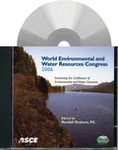Protocols for the Evaluating the Effects of Land-Use Patterns and Runoff Management on Urban Streams
Publication: World Environmental and Water Resource Congress 2006: Examining the Confluence of Environmental and Water Concerns
Abstract
The design of urban runoff management facilities generally includes peak shaving for flood control, and best management practices (BMPs) for removing pollutants from the runoff. A number of scientists have concluded that the combination of these two control practices, which were developed independently of one another, is not sufficient to protect aquatic ecosystems. But these conclusions have focused solely on the bioassessment of urban streams without taking into account the design criteria used for peak flow reduction facilities and for BMPs. Previous studies at the Colorado State University Urban Water Center (CSU), have demonstrated that if the design storms for peak flow control are properly chosen and used in conjunction with the properly sized volumetric BMPs, it is possible to preserve the predevelopment peak-flow frequency curve and to minimize geomorphic instability in an urbanizing watersheds. Current research at CSU is now focusing on the development of a protocol for data collection along urban gradients combined with mathematical modeling to determine the ecologic impacts of urban runoff resulting from different land use patterns and/or implementation of alternative runoff management technologies. This study builds upon a previous study conducted for the Water Environment Research Foundation on the Physical Effects of Wet Weather Discharges on Aquatic Habitats — Present Knowledge and Research Needs. A protocol is being developed that includes a procedure for data collection and analysis to determine how statistical characteristics of stream-flow, i.e. "stream metrics," change with urbanization and runoff management practices, and how these stream metrics can be used to estimate geomorphic stability and health of a stream ecologic system under alternative development and/or runoff control scenarios. This paper describes the protocol that has been developed and how it is being applied to test areas in the Raleigh, North Carolina area, using data gathered by the USGS in their Urban Gradient Studies under the NAWQA program.
Get full access to this chapter
View all available purchase options and get full access to this chapter.
Information & Authors
Information
Published In
Copyright
© 2006 American Society of Civil Engineers.
History
Published online: Apr 26, 2012
ASCE Technical Topics:
Authors
Metrics & Citations
Metrics
Citations
Download citation
If you have the appropriate software installed, you can download article citation data to the citation manager of your choice. Simply select your manager software from the list below and click Download.
